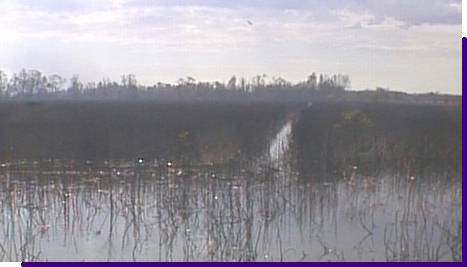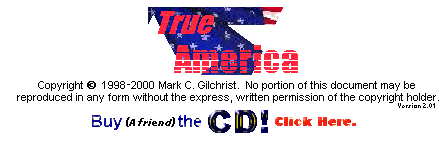Kissing the Blues


 Wednesday, January 6, 1999, Loreauville Village, Louisiana-
They are little lobsters, is all they are, only with no claw meat worth chasing, and you just snap the head off, suck the juice and fat out, and toss it. Then you break open the tail, like you would a lobster - a really small lobster - and eat the meat, the delicious meat of the crawfish.
Wednesday, January 6, 1999, Loreauville Village, Louisiana-
They are little lobsters, is all they are, only with no claw meat worth chasing, and you just snap the head off, suck the juice and fat out, and toss it. Then you break open the tail, like you would a lobster - a really small lobster - and eat the meat, the delicious meat of the crawfish.
This is a Louisianan delicacy, and though it looks, tastes and smells like seafood (and it is a shellfish) it doesn't come from the sea. Yes, another difference between these little creatures and lobsters is that, to catch a lobster. you have to fight the cold, dark, deep Atlantic Ocean. For crawfish, you adopt the easy, Louisianan attitude, in a freshwater pond only a foot deep. And some of these creatures exist, the Cajuns believe, merely to bring us good luck.
 "Anybody can raise crawfish," says Anna Boudreaux, a Cajun woman who, with her boyfriend, Bookie (pronounced "Boo-key") has had a farm in Loreauville, near New Iberia, for five years. "Just get some land near a bayou, build a levee and pump it full of water." Actually, you don't even have to build a pond to raise crawfish, as many are raised in the wild, in the marshy area between Lafayette and Baton Rouge.
"Anybody can raise crawfish," says Anna Boudreaux, a Cajun woman who, with her boyfriend, Bookie (pronounced "Boo-key") has had a farm in Loreauville, near New Iberia, for five years. "Just get some land near a bayou, build a levee and pump it full of water." Actually, you don't even have to build a pond to raise crawfish, as many are raised in the wild, in the marshy area between Lafayette and Baton Rouge.
|
Amazin' Cajun Boiled Crawfish Ingredients - 35 pounds Crawfish* 7 gallons Water 2 pounds Salt 10 oz. Red Pepper Sauce 1 Tbspn Lemon Juice 12 White Onions 4 pounds Potatoes o Get out your biggest pot - you'll be cooking 35 pounds of these critters. And set the table for plenty of friends, 'cause they will swarm to your place when word gets out you're having a crawfish "ball" o Par-boil the potatoes. o Fill your pot about halfway with water (you're not steaming these, but boiling them ("balling" as they say in southern LA.) crank up the gas and wait for it to "ball". o Heave everything in the pot, like a big ol' stew. o Wait until the water starts boiling again, then only about three to four minutes. Drain the water and have a feast.
* No, you don't have to cook 35 pounds, but if you cook less, don't bother inviting me!
|
Boudreaux has fished her share of crawdads - working the ponds full time their first year - but these days, Bookie manages the harvest and Boudreaux takes time off from her secretarial job only to help out during peak season, a time when crawfishing really becomes a family affair around here.
 Bookie is laid up with a broken back, so I asked Boudreaux if I could tag along with her as she and Bookie's father, Lester Romero, survey the ponds for the upcoming season.
Bookie is laid up with a broken back, so I asked Boudreaux if I could tag along with her as she and Bookie's father, Lester Romero, survey the ponds for the upcoming season.
The three of us climb into a john boat and Romero fires up the go-devil, which is basically a lawnmower engine connected to a propeller with a five-foot long shaft. Go-devils are popular rigs around here, used to push boats through the shallow waters of crawfish ponds. We head off to some traps which have been set for pre-season. The john boat slowly plows through the water as the devil tears up the scene behind us, spewing a melee of noises. Its prop, just barely in the water, churns and slaps it frantically, in a cacophonous chorus with the troubled Honda engine.
Approaching a trap, Romero slows the boat. Boudreaux stands up and pulls the trap up off a metal rod set in the pond bottom. She dumps a few crawfish in the boat and puts the trap back. Half a dozen crawfish squirm on the deck of the boat, pinching the air - a good catch. "You find more crawfish where the water is dirty," Romero says. "That means they're moving around, crawling on the bottom."
 As we sit by a trap, the devil growling at idle, there is a beautiful scene before us; a quiet pond, tall grasses swaying in the breeze, playful clouds kissing a perfect, blue sky, and birds circling and floating. "It's better than a psychiatrist," Boudreaux says. "You come out here and there's no phone, there's nobody on your neck. You just have water and quiet and different scenery of birds or snakes or animals."
As we sit by a trap, the devil growling at idle, there is a beautiful scene before us; a quiet pond, tall grasses swaying in the breeze, playful clouds kissing a perfect, blue sky, and birds circling and floating. "It's better than a psychiatrist," Boudreaux says. "You come out here and there's no phone, there's nobody on your neck. You just have water and quiet and different scenery of birds or snakes or animals."
Boudreaux says there is a large turtle in the front pond. "He's an old grand-dad, and when we catch him, he's gonna make a dawgone good turtle sauce piquant!"
 Southern Louisiana is an interesting place. The creole is a melodic bounce of words and phrases of French and English origin. You can usually find a good market for raccoon pelts, and cock fighting is still legal. The state is the top producer in the nation of shrimp, sugar cane and rice, and more ducks are pulled out of the Louisiana sky than over any other state. You can spend every weekend of the year (except in December) at a harvest or other festival.
Southern Louisiana is an interesting place. The creole is a melodic bounce of words and phrases of French and English origin. You can usually find a good market for raccoon pelts, and cock fighting is still legal. The state is the top producer in the nation of shrimp, sugar cane and rice, and more ducks are pulled out of the Louisiana sky than over any other state. You can spend every weekend of the year (except in December) at a harvest or other festival.
|
Eat Tail. Eating Crawfish the Cajun Way
1. Grab biggest crawfish on plate. 2. Pull head off tail. 3. Suck juice from head. Mmm! 4. Peel shell away from tail. 5. Pinch tail to remove meat. 6. Enjoy delicious meat! 7. Grab biggest crawfish... |
 To properly research this story, I visit a seafood market near where I am staying in Mandeville - just over the world's longest bridge from New Orleans - and I buy a half pound of crawfish. The season won't start for another week or two and I am lucky to find these guys. They are $2 a pound, and will likely cost half that at peak season, according to Joey Capdeboscq, who cooked them for me. After the distributor gets his share, the fisherman will get less than fifty cents a pound for all his work; for all his managing the ponds, leasing the land, and paying for bait, gas, labor and traps. Yet, it is all worth it, for this Louisiana delicacy.
To properly research this story, I visit a seafood market near where I am staying in Mandeville - just over the world's longest bridge from New Orleans - and I buy a half pound of crawfish. The season won't start for another week or two and I am lucky to find these guys. They are $2 a pound, and will likely cost half that at peak season, according to Joey Capdeboscq, who cooked them for me. After the distributor gets his share, the fisherman will get less than fifty cents a pound for all his work; for all his managing the ponds, leasing the land, and paying for bait, gas, labor and traps. Yet, it is all worth it, for this Louisiana delicacy.
Boudreaux and Bookie have had a tough time with their crawfish ponds; "We have not had a good year yet," Boudreaux says. But she is optimistic; "They're saying on TV that it's supposed to be a really good season this year."
 Crawfish could actually be considered the all-American shellfish, as there are two varieties; one with red meat and one with white. The red are the hearty, large and usually wild crawfish, while the white are milder. And then there are the blues. On great, rare occasions, you'll empty your trap on the tray and you'll see a blue-shelled crawfish squirming around. This guy is rare and is considered to be a good luck charm to the Cajuns, but only if you give him a kiss and toss him back in the water. Kiss the blue crawfish and spare his life, and you will be blessed with good luck from the heart of Cajun country, where luck, both good and bad, is nearly a religion.
Crawfish could actually be considered the all-American shellfish, as there are two varieties; one with red meat and one with white. The red are the hearty, large and usually wild crawfish, while the white are milder. And then there are the blues. On great, rare occasions, you'll empty your trap on the tray and you'll see a blue-shelled crawfish squirming around. This guy is rare and is considered to be a good luck charm to the Cajuns, but only if you give him a kiss and toss him back in the water. Kiss the blue crawfish and spare his life, and you will be blessed with good luck from the heart of Cajun country, where luck, both good and bad, is nearly a religion.







Want to be a CRAWFISHERMAN?
|
Check out the True America Features Archives
Return to our MAIN page

